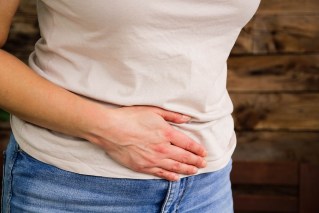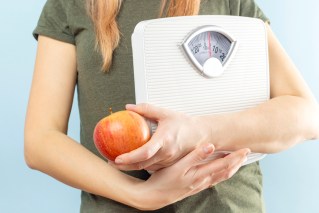Warning on protein-based supplement diets after death of female bodybuilder


Meegan Hefford was doing two gym workouts a day and eating protein-heavy meals in the weeks before her death. Photo: Instagram
It’s not impossible to suffer protein poisoning from everyday food, but you’d have to really work at it, says one of our top food scientists.
The comments come after the death in June of Perth bodybuilder Meegan Hefford, whose collapse has since been revealed was triggered by her protein-rich diet of supplements, shakes and egg whites.
Ms Hefford, a 25-year-old mother of two, was among the one in 8000 people who suffer urea cycle disorder, a genetic condition that alters the way food is metabolised.
It stopped her body breaking down her overload of protein, and caused a build-up of ammonia in her blood and fluid in her brain.
The most likely way of killing yourself by eating too much steak or tofu is by choking on it.
On the other hand, Neil Mann, Professor of Food Science and Human Nutrition at the University of Melbourne, says if all you’re chugging down is protein powders in milk, you can get yourself into trouble.
An excess of amino acids in the bloodstream can lead to lethargy, irritability, loss of appetite, vomiting, hyperventilation and seizures.
A spike in insulin will give you diarrhoea. An excess of ammonia does all that and will eventually kill you.

Meegan Hefford with her two children. Photo: Instagram
Professor Mann says the debate how much protein we need and can tolerate is an open-ended one.
“There’s a lot of variability, and a big gap between the minimum requirement and the maximum,” he says.
Generally, people need a minimum of 0.8 grams per kilo of body weight – but pregnant women and developing children probably need more.
On that basis, a person weighing 80 kilograms would need at a minimum 64 grams of protein – which is more than it seems, given 80 per cent of a steak, for example, is actually water.
Professor Mann says that you can “possibly go up to three or four grams per kilogram body weight without any real harm – but it’s unnecessary to do that”.
He notes that bodybuilders − or people on a high-protein diet for slimming reasons – consume a purified form of protein in the form of powders. And that’s where the risk lies.
“If you’re eating normal foods, it’s almost impossible to overeat protein to the point of being toxic,” he says.
Ms Hefford’s mother, Michelle White, says her daughter had been doing two gym workouts daily and eating protein-heavy meals, as well as taking the supplements in the weeks before she died. She has called for the sale of protein products to be regulated.
“[I] couldn’t believe what the doctors were telling me, that she was dying,” Ms White told Perth Now. “She didn’t look sick, she looked beautiful.”
Professor Mann says the toxicity arises when protein is broken down in the digestive tract; excess nitrogen produces ammonia which is then broken down in the liver to urea, which in turn travels via the bloodstream to the kidneys, where it’s excreted in urine.

Protein powders are a health risk, according to Professor Neil Mann. Photo: Getty
If it doesn’t break down quickly enough, the ammonia builds up and the body gives up.
“Unless you have some genetic susceptibility, where you don’t break down protein very well – or you may break it down but you can’t get rid of the ammonia in your body quickly enough – you won’t have problems,” he says.
Professor Mann says there have been rare events in the historical record where people ate nothing but pure, lean protein and died.
“There’s a situation called rabbit starvation which occurred in the early days of American settlement, when the settlers were going west in the wagon trains. In the winter months there was nothing for them to eat but small rodents like rabbits. At that time of year, the animals don’t carry much fat.
“So when you kill and eat them, you’re eating virtually pure protein. And if they didn’t have anything else in their diet, they ate protein for weeks on end. There were recorded instances of people dying from ammonia poisoning. We would never normally eat that much protein.”
Still, the question of exactly how much is too much remains educated guesswork.
“It’s a vague area because other animals metabolise protein differently to us – and yet we can only do animal studies. We can’t do human studies because it does harm to people,” he says.
“There was only one study on humans done some years back, before ethical considerations were taken into account. Most calculations are based on that study.”








